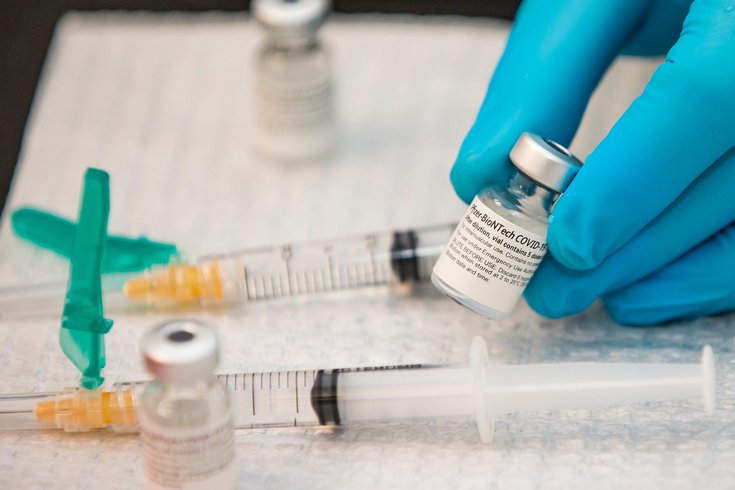
January 19, 2021
 Doug Engle/Imagn Content Services, LLC
Doug Engle/Imagn Content Services, LLC
As Philly's COVID-19 vaccine access expands, first responders are among the group of frontline and essential workers now eligible for appointments. Phase 1B of the city's vaccination plan also covers people over 75 years old and those with high-risk medical conditions.
Philadelphia will immediately broaden COVID-19 vaccination eligibility to essential workers, seniors over the age of 75 and people with certain high-risk conditions.
Phase 1B of the city's vaccination plan is expected to continue for several months and will be contingent upon how quickly the supply of vaccine doses expands, Health Commissioner Dr. Thomas Farley said Tuesday.
"Effective today, we are asking hospitals and federally qualified health centers that have vaccine to start offering vaccine to their patients with the highest risk of the conditions that meet our definition of Phase 1B," Farley said.
High-risk conditions covered in Phase 1B include diabetes, chronic kidney disease, cancer and organ transplant recipients.
The city's health department also has reached out to certain groups of frontline and essential workers to schedule appointments for vaccinations. These include first responders, such as police and fire department workers, and corrections officers, public transit workers, and service providers who work with vulnerable populations.
"These groups will take weeks to be vaccinated, at which point, additional prioritized groups will start receiving invitations to schedule appointments to be vaccinated," the health department said in a news release. "Additionally, the health department will work with congregate settings to connect them to vaccine providers."
At this stage, the city is not yet ready to offer vaccines to teachers, food-service workers and child care workers. The health department said educators will be notified through their employers when they are eligible.
Farley said there are about 93,000 people over the age of 75 in Philadelphia and more than 130,000 people who have diabetes.
Patient-facing health care workers who have not yet received a COVID-19 vaccine are still eligible to reach out to schedule an appointment.
The city has been told it will continue to receive a combined total of about 20,000 doses of the Pfizer and Moderna COVID-19 vaccines per week — plus the appropriate second doses — through the end of February, which Farley described as a "very limited supply."
Philadelphia reported 1,666 additional cases of COVID-19 on Tuesday, which represents a four-day total. The citywide total increased to 101,629 since the start of the pandemic.
"This is an unfortunate reminder that COVID is still very much with us," Mayor Jim Kenney said. "And I have no doubt that without 10 months of hard work, Dr. Farley’s leadership, precautions and, yes, restrictions that none of us like, we would have hit that dubious milestone far earlier."
Case counts on the whole, though still high, are trending in a positive direction, Farley said.
For the week of Jan. 10-16, the city averaged 476 cases per day and a test positivity rate of 7.6%, based on currently available data. For the week prior, the city averaged 635 cases per day and a test positivity rate of 8.9%.
"We're definitely in decline here in Philadelphia," Farley said. "That's in the context of declines all around us. Pennsylvania, New Jersey and the United States as a whole are now seeing decreases. I believe this is the down side of the spike in cases that occurred from gatherings over Christmas and over New Year's."
As of Tuesday morning, there were 538 people being treated for COVID-19 at Philadelphia hospitals, continuing a decline since a second peak in December.
Another eight fatalities raised the city's COVID-19 death toll to 2,720 since the start of the pandemic. The United States surpassed 400,000 deaths from COVID-19 on Tuesday.
"The vaccine will take months to fully roll out, so our diligence, and our devotion to helping others must continue," Kenney said.